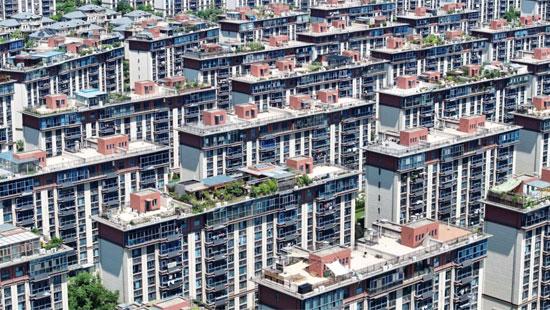24 May 2024 - {{hitsCtrl.values.hits}}
 In the aftermath of the monumental collapse of Evergrande, China's largest real estate company, and several other prominent firms such as Country Garden, Soho, Sino Pride, Unispace, Man Hing Hong, Top Capital, Vivid Invest, and Vanke, the Chinese real estate market continues to decline. Despite numerous attempts by the central government to rejuvenate the sector, the market remains troubled. This is a critical issue for the Chinese Communist Party (CCP) as the real estate sector represents a significant one-fifth of the Chinese economy. Failure to revive this sector could precipitate a severe crisis in an already stagnating economy, highlighting the sector's importance to China's economic stability and growth.
In the aftermath of the monumental collapse of Evergrande, China's largest real estate company, and several other prominent firms such as Country Garden, Soho, Sino Pride, Unispace, Man Hing Hong, Top Capital, Vivid Invest, and Vanke, the Chinese real estate market continues to decline. Despite numerous attempts by the central government to rejuvenate the sector, the market remains troubled. This is a critical issue for the Chinese Communist Party (CCP) as the real estate sector represents a significant one-fifth of the Chinese economy. Failure to revive this sector could precipitate a severe crisis in an already stagnating economy, highlighting the sector's importance to China's economic stability and growth.
In a strategic move to provide affordable housing, China has announced that local government authorities will be allowed to purchase homes at "reasonable" prices. Vice Premier He Lifeng revealed this policy during an online meeting on housing policy, as reported by the official news agency Xinhua. To further stimulate sluggish property demand, China plans to reduce mortgage loan interest rates and down-payment ratios for homebuyers, as outlined in three statements released by the central bank. However, the effectiveness of the government's purchase program in stimulating private sector demand remains uncertain. While clearing inventory will improve cash flow for developers and bolster their financial stability, it does not address the lack of confidence in the private sector, which can only be restored if the government redefines the role of property investment.
These initiatives have been met with skepticism by economists both within China and internationally. Many express a negative view, arguing that China’s economy is currently experiencing deflation with no signs of an upward trend. This perspective underscores the challenges faced by the Chinese government in its efforts to stabilize and stimulate the economy.
Economic experts are also not optimistic about the CCP’s real estate policy. They note the heightened urgency to bring stability to the housing market as a positive development, especially in light of the sharp month-on-month drop in housing prices observed in April, marking the steepest decline in the current cycle. While this could indicate sentiment stabilization in China, a potential recovery in housing prices is just the beginning. High levels of unsold housing inventory are likely to continue dampening real estate investment, weighing heavily on the economy this year.
Bruce Pang, an economist with Jones Lang Lasalle in Hong Kong, noted that the central bank's mortgage rate cuts and reduced down payment ratios suggest Beijing is using monetary policy to address demand in hopes of a decisive recovery. However, he cautioned that a sustained rebound will require cooperation from residents' incomes, business confidence, market sentiment, and economic growth expectations. A significant challenge is the eroding faith of citizens in the CCP over the past few years. The prevailing sentiment is one of reluctance to part with hard-earned money, shaped by the economic devastation of the Covid-19 pandemic and the stringent lockdown policies implemented by the CCP.
The repercussions of these measures are still felt across the country, with many individuals having lost their jobs and depleted their savings. With limited financial resources and an uncertain future, people are hesitant to make significant purchases. Under these circumstances, a positive turnaround in the Chinese economy seems distant, casting a shadow over the nation's economic future.
Conversely, some experts believe the current policies aimed at clearing inventory are more effective than previous measures. Psychologically, these policies could lead investors to perceive that the government is shouldering the financial burden, thereby transferring the risks associated with the property market to banks and local governments, entities already grappling with economic pressures.
Despite various policy measures implemented since 2022, China has been unsuccessful in revitalizing its property sector. This sector, once responsible for a fifth of the country's economic activity, continues to be a burden on growth. Over recent years, more developers have been unable to meet their debt repayment obligations, with some, including the China Evergrande Group, being mandated to liquidate.
The banking sector has been hesitant to respond to Beijing's consistent prompts to increase credit to the struggling property sector, primarily due to the risk of accruing more bad loans. To alleviate this, both central and local governments in China are advancing policies aimed at reducing the inventory of unsold housing. Large cities like Beijing and Shenzhen have relaxed restrictions on home purchases, and some cities have introduced policies allowing homebuyers to exchange their old homes for new ones. Despite these efforts, the property sector remains a challenging area for the Chinese economy.
25 Dec 2024 2 hours ago
24 Dec 2024 24 Dec 2024
24 Dec 2024 24 Dec 2024
24 Dec 2024 24 Dec 2024
24 Dec 2024 24 Dec 2024